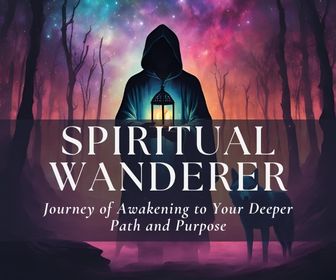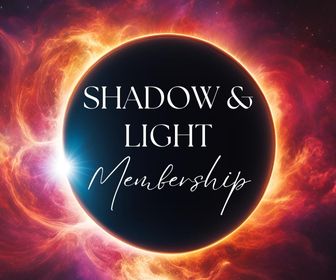It all added up. Sensitivity to loud sounds, harsh light, emotional climates, and over-stimulating situations? I’d just discovered something amazing: I’m a highly sensitive person.
For years, since childhood, I had always believed there was something terribly weird, different, strange, or broken about me.
New situations easily overwhelmed me. Strangers set me on edge. Loud sounds made me jump out of my skin. And even the slightest amount of coffee or alcohol sent me into a tailspin.

Spiritual Wanderer Course:
Being a lone wolf and a spiritual wanderer is a sacred calling in life – a unique and alchemical path of awakening. You don’t need to feel lost, alone, or stuck on your journey any more. It’s time to meet your soul’s deep needs for clarity, self-acceptance, and empowerment. Let us show you how …
If you can relate to this level of sensitivity, you might be a highly sensitive person.
The life-changing reality of this label is that it helps you to accept that (1) you’re not crazy, (2) there’s nothing wrong with you, and (3) you’re not alone.
Table of contents
What is a Highly Sensitive Person?

Highly sensitive people (HSPs) are individuals who are genetically predisposed to higher levels of mental, emotional, and physical sensitivity. It is speculated that around 15-20% of our population is wired differently and therefore experiences life in a much more intense way than the average person. HSPs differ from neurotypical individuals in that they are more deeply impacted by sights, sounds, smells, tastes tactile sensations, and emotions.
19 Signs You’re a Highly Sensitive Person

Mother of the discovery, Elaine Aron, has been researching the highly sensitive person for over 20 years now. As such, she has a finely tuned list of traits and behavioral quirks that define the highly sensitive person. I’ve refined some of these traits below. See how many you can relate to:
- I’m aware of subtleties and nuances in different environments, e.g., a tap dripping too loudly, a light bulb burning too brightly, etc.
- I’m easily overwhelmed by the senses. Loud noises, strong smells, tastes, and light affect me negatively, e.g., the pounding music of nightclubs, loud busy freeways, and strong perfumes.
- I need to withdraw from busy days and take a break, or a nap, by myself.
- I’m overly sensitive to pain, e.g. needles, sports injuries, insect stings, etc.
- I become spooked and startled easily.
- I like to take my time, and not overload myself with too many activities as it drains and overwhelms me.
- I prefer to avoid violent TV shows and movies.
- I find it hard to adapt to changes in my life.
- I tend to ruminate and process information deeply.
- I’m empathic. I’m aware of the way people feel around me, and when any slight change occurs in them.
- Emotional environments tend to affect me deeply.
- I’m often perceived as being introverted or shy.
- I’m profoundly moved by nature, the arts or music.
- I tend to be more philosophically and spiritually-orientated.
- I feel unusually strong emotions.
- I avoid and deeply dislike confrontation of any kind.
- I prefer to not be observed when fulfilling tasks: it unsettles me.
- I tend to avoid situations that are too intense or chaotic.
- I seem to process the world at a very deep level.
How many of these qualities did you say “yes” to? I’d love to hear in the comments!
HSPs, Emotional Intensity, and Giftedness

Perhaps one of the defining qualities of being an HSP is how emotionally intense we are.
We feel everything in an intense, passionate, and sometimes devastating way. This intensity often leads us to become artists, visionary leaders, innovators, mentors, healers, and therapists.

Shadow & Light Membership:
⭐️⭐️⭐️⭐️⭐ "Receiving these messages is a beacon of light and hope for me in currently very challenging times. The words of wisdom speak right to my soul, guiding and encouraging me further on my path. I highly recommend Shadow & Light to everyone who seeks to develop and cultivate a relationship with the Inner Self." – Karin
But this is a bittersweet trait we share because while it helps us to live life with passion and intensity, it can also isolate us. We may be misunderstood, criticized, underpaid, undervalued, taken for granted, alienated, and generally perceived as being “too much.” We may be classified as neurotic, melodramatic, thin-skinned, or generally finicky – and mistreated because of it.
Yet, despite the many challenges we face, our intensity and giftedness as highly sensitive people also opens the doorway to potentially transcendent and cosmic adventures. For example, many people who are highly sensitive undergo spiritual awakenings and various mystical experiences. Because we are naturally sensitive and more in-tune with the undercurrents of life, we often find ourselves having paradigm-shifting insights about the nature of reality.
In fact, many highly sensitive people are also naturally gifted empaths and old souls who gravitate toward various spiritual pursuits that explore the meaning of life and how to experience spiritual Oneness.
Regardless of whether you’re spiritually-inclined or not, you will have the insatiable need to live authentically and find your true purpose.
Common Myths About the Highly Sensitive Person

As with any neuroatypical group, HSPs deal with their fair share of misguided judgments. Here are the three most common misconceptions about HSPs:
Myth #1: HSPs are introverts
HSPs and introverts both reflect deeply and have rich inner worlds – but not all HSPs are introverted, and vice versa. In fact, as Aron points out, 30% of the total number of highly sensitive people are actually extroverted. It’s a smaller number, but it still shows that introversion does not always equate to being highly sensitive.
Myth #2: Being an HSP is just another word for being shy
Just like introverts, highly sensitive people are often mislabeled as being shy. Although the two share things in common – such as sensitivity to overwhelming social situations – they are not the same thing. While shyness is learned, being a highly sensitive person is not.
Myth #3: “HSP” is a mental disorder
For some, it can be easy to mistake the highly sensitive person as a sufferer of some strange mental condition. Although some HSPs possess separate mental illnesses, being sensitive does not automatically make someone mentally ill. Instead, sensitivity is a trait, a gift even, that some people possess and others don’t. Besides, what pathological mental disorder allows the sufferer to be endowed with such genuine joys as being more empathic, spiritually-orientated, and appreciating the details of life more fully?
How to Survive as an HSP

Due to their sensitive nature, highly sensitive people are prone to idealism and perfectionism. This often stems from deriving our self-worth from the opinion of others, and not valuing ourselves enough. (And the self-worth issues we often develop are due to not being appreciated or understood throughout life.)
Also, being a highly sensitive person can hit you hard if you’re a male. Being a thick-skinned logician is favored as the masculine ideal in the Western world, rather than the sensitive, emotional poet. But whatever difficulties we face as highly sensitive people can be overcome with the ability to reframe the negative into the positive, and actively work to better our environments. Here are some tips:
Would you like to save this?
Your information will never be shared.
1. Learn to value yourself
I learned this the hard way. When we place too much importance on what people say and think about us, we create immense psychological tension and anxiety. We are living to satisfy the thousands of different perspectives of who we “should” be, rather than embracing what we are. In essence, we are creating the exact thing we try to avoid that is detrimental to us: too much internal pressure and chaos. So be nice to yourself. Learn to value your qualities and gifts. Realize that you’re the one and only master over yourself, and no one can have power over you unless you let them.
2. Don’t take things personally
This tip, mentioned by Don Miguel Ruiz in his well-known book The Four Agreements, is essential for mental and emotional happiness.
The highly sensitive person is prone to get hurt easily by other people and their words. Consequently, we frequently find ourselves on-edge in social situations, trying to finely tune our behavior to avoid conflict.
When we take the insults and the moods of other people personally, we blame ourselves. We think that somehow we’re responsible, even deserve their abuse, but we’re not and we don’t.
To overcome the dilemma of taking things personally, try looking beyond your feelings. Use your ability to analyze instead and think to yourself, “I wonder what type of pain this person is suffering to treat me that way?” For example, perhaps they had a really bad day? Perhaps they’re going through a divorce? Perhaps they got triggered? Perhaps they had bad sleep?
When we ask these “why?” questions, we go beyond the initial sting of being mistreated and realize that ultimately, how people treat us is a reflection of them, not us. As Don Miguel Ruiz says, “nothing other people do is because of you.“
3. Embrace solitude
Solitude is not loneliness, instead, it is a chosen form of being alone, rather than an imposed one. When we choose solitude and take mini-retreats from our stimulating days, we give ourselves the gift of re-cooperation. As highly sensitive people, we need to be in-tune with our minds and bodies and the warning signs of burnout, such as irritability and physical exhaustion. So take a bit of alone time to renew yourself.
4. Investigate, identify, and act upon your sensitivity triggers
Wouldn’t life be a whole lot easier if we managed to resourcefully alter or intelligently negotiate our way around the stresses and stimulations that come our way? Of course, we can’t plan everything, but for the stresses currently existing in our lives, we can work to plan ahead and alleviate the incoming tension.
As an HSP, I struggled with this, stoically putting up with the extreme anxiety I felt at work until I realized that it was weakening my health. No, I didn’t do something drastic like quit my job, but I did decide to plan ahead and practice self-hypnosis every time I had to go to work, to prepare myself for the day. I still do.
As an HSP, you may be suffering from the same problem I did: a self-sacrificial acceptance of your less-than-healthy response to a situation in life. If you find yourself daily frazzled, try identifying what makes you so stressed out and think about what you can do to actively make your life easier to live. Life wasn’t meant to be bared with gritted teeth.
5 Ways to Stop Emotional Snowballing as a Highly Sensitive Person

Your heart pounds, you begin to tremble, your chest constricts, pain shoots through your core, your mind blurs … and all this, simply as a response to a threat, insult or even a simple tone of voice.
Highly sensitive people frequently live life on the brink of emotional snowballing, a term I use to describe a situation where emotions get out of control and quickly become out of proportion to the situation at hand.
Just think of a small snowball rolling down a very steep hill – it becomes larger and larger and rolls faster and faster very quickly. For many highly sensitive people, this emotional turbulence is a fact of life.
But why? As Elaine Aron pointed out in her book The Highly Sensitive Person, “most of us are deeply affected by other people’s moods and emotions.” In fact, you could say that most highly sensitive people are simply excellent social chameleons to the emotional landscapes around them.
This can be good news if everything is peachy bliss, but many times, highly sensitive people find themselves absorbing the poisonous negativity around them. You could say that the highly sensitive person’s problem is taking things too personally. But it’s much more than that. The highly sensitive person is deeply affected by any highly stimulating situation, whether physical, mental and emotional.

Inner Work Journal Bundle:
⭐️⭐️⭐️⭐️⭐ "I highly recommend this. Each journal is beautifully designed, with ample room for reflection and gorgeous supporting images and quotes. Anyone who uses these journals is likely to experience a priceless payoff." – D
In a sense, you could say they feel everything at a more extreme level than the non-HSP person. While this can make life a lot more profound for highly sensitive people, it can also make interpersonal relations very bitter indeed.
Below you will find four techniques I have found useful in preventing emotional snowballing. I’m a highly sensitive person myself and hope these will help quell the tidal waves of emotion when they roll your way:
1. Seek out a quiet, empty spot to cool down
As I mentioned before, highly sensitive people suffer a lot at the hands of hyper-arousing and stimulating situations. The best thing to do when you become aware of the symptoms of emotional stress is to remove yourself from the situation. Excuse yourself, or simply walk away from the person or people that are causing you harm and find a deserted, empty place.
I say deserted and empty because the least stimulating, the better. You need to make time to re-cooperate and soften the violent sensations inside of you. I find that the bathroom is usually the best place to go, especially when the lights are out and everything is muted and dim.
2. Focus on something that made you happy today
If nothing made you happy today, try the past week, or you could think about the best thing that ever happened to you. I find that focusing on something positive helps break the cycle of negative emotions that begin to quickly increase inside. It also helps to remind you that life wasn’t always as painful as it seems in the present moment, and helps give you perspective.
If you have had a bad run-in with a specific person in particular, you can also try thinking of the last time you enjoyed being in their company. Did they make you laugh, did you share something nice together, were you excited to talk to them? This works especially well with family members and close friends who have upset you.
It’s good to remember that everyone has bad days once in a while, and they aren’t necessarily angry at you – in fact, usually, they aren’t. They are simply reacting to their own bad feelings and taking it out on you. Once again, this technique of focusing on a past positive experience works well after you’ve sought out a quiet and empty spot to re-cooperate.
3. Listen to, or watch something upbeat
The biggest mistake that I made as a highly sensitive person was to listen to melancholic, dark music when I felt emotionally strained. Although it’s nice to feel as though others can relate to the way you feel through their music, this is not always a healthy way to deal with emotional turmoil.
If you’re primarily an auditory learner like me, listening to happy music is one of the best ways to stop emotional snowballing. I know it’s cliche, but try listening to “Don’t Worry, Be Happy” by Bob McFerrin for starters! (It’s bound to make you smile!) If you’re primarily a visual learner however, the next best alternative is to watch a comedic movie that will allow you to relax and break out of the negative cycles of emotion. Have a list of comedy movies at hand, just so you don’t lose time frantically scavenging for one. (By the way, if you want to find out what kind of learner you are, take our Visual, Auditory, or Kinesthetic test.)
4. Ground and orient yourself to your surroundings
When you feel like you’re spiraling out of control (i.e., feeling overwhelmed, inundated, panicky, grief-stricken) find something beautiful, calming, or pleasant in your environment to focus on. This technique is often used in somatic psychotherapy for trauma sufferers and works wonders with highly sensitive people.
For example, you may choose to focus on a patch of sunlight on the ground, a vase of flowers in the distance, a child running and laughing, the calming color of the wallpaper, or anything else that brings you a burst of delight.
Orienting to something safe and pleasant in your environment is a powerful grounding technique that you can use anytime, anywhere.
5. Remember that this too will pass

This philosophic approach to preventing emotional snowballing for the highly sensitive person is a powerful way to transcend your emotional strife and look at life with a birds-eye perspective.
Think of everything good and bad that has ever happened to you. All of it has passed by and has been replaced with something different: the good with the bad, and the bad with the good.
Life is a constant flux; a wax and wane of good and bad. If everything was always good, we would find life boring and we’d take it for granted. In this way, the bad moments in our lives can even be seen as necessary and beneficial – they provide a contrast for the good so we can appreciate it even more fully.
So just remember: when you are close to an emotional snowball, remember that this too will pass. Like everything in your past, it will perish and be replaced with something else.
Are you a highly sensitive person? Do you have anything to add to this article? If so, please do below.
Also, you may like to take our Highly Sensitive Person (HSP) Test.
If you need more help, we offer 3 powerful ways to guide you on your inner journey:
1. The Spiritual Wanderer Course: Feeling lost or uncertain about your path and purpose in life? Gain clarity and focus by learning about the five archetypes of awakening within you. Discover your deeper path and purpose using our in-depth psychospiritual map. Includes 3+ hours of audio-visual content, workbooks, meditations, and a premium test.
2. Shadow & Light Membership: Seeking ongoing support for your spiritual journey? Receive weekly intuitive guidance and learn to embrace your whole self, including your shadow side. Deepen your self-love and receive personal support from us.
3. Spiritual Awakening Bundle: Ready to soul search and dive deep? Access our complete "essentials" collection of beloved journals and eBooks. Includes five enlightening eBooks and seven guided journals, plus two special bonuses to further illuminate your path.







I just recently learned of all this. I knew I was different but not why and how. I am still processing. It is good to know. :)
This is excellent to hear Crystal! Many thanks!
Finally someone understands me. My eyes are very sensitive to light. As a child, when we would go to church on Sunday nights, my mother let me put my head down in her lap because the lights made my eyes hurt after awhile. I always thought that my problems with life stemmed from my traumatic childhood with a father who had a bad temper. All of these fit me, except I do like some scary movies. If there is a lot of needless violence though, I find myself getting angry. I always thought there was something wrong with me. Now I know I am not alone.
Thank you Barbara! I’m happy to hear that this article helped you to understand yourself better. In fact, I’m having the same problem at this very moment of typing: the light of the computer screen is giving me a terrible headache (resulting in me darkening the screen down to 0% usually). Many thanks for commenting!
Thank you for writing such a good article. It was a good read for me and i found it very informative. Thank you once again :)
I also referred it to my girl friend to overcome her weak parts.
Thank you for reading Muhammad! I very much appreciate your comment! -L
There was a period in my life when I could sense the electricity circulating in the wires inside the walls and had to sleep outside in the countryside. I’m still extremely sensitive to bio energies in my environment and it requires great focus for me to be able to function among people.
What I’ve found helps with being highly sensitive is:
Eating plenty of healthy fats if you are a vegan or eating meat helps somewhat;
Establishing strong boundaries by communicating of our feelings, needs and requests to others accordingly is even more effective;
Becoming aware of our emotions, needs, values, passions and based on this clarity on what’s important to us beginning to shape our life towards a more fulfilling future. This will keep the aura in the confines of the body, present and focused, and NOT touching the outside world in a dependent and confused way picking up unnecessary information through the senses.
Attila, many thanks for your comment and insights! I hope that others who fall on this page read your suggestions and try to adopt them into their own lives. Thank you for an inspiring post!
I am very Introvert and HSP, all the symptoms above match so perfectly…
I cannot handle any confront at all, instead I have to avoid the discussion and I feel really burnt inside when I am pretty sure that I am right but the person in front just don’t want to listen your opinion/idea/argument and just keep on exerting that point I am making is wrong and their one is right.
Is there any way out to get rid of this?
Hello Abhishek,
Its a very common problem amongst Introverts, especially HSP. Its a double whammy!
In having discussion and exchanging different points of view with Luna, Ive learned how she processes things much more slower and too much information can overwhelm her. When we first met each other, we shared a lot of different opinions. She had many ideologies and erroneous beliefs that would hinder her lifestyle, and she unconsciously felt it which is why she would talk to me cause I tried to provide clarity and make some sense of it all. Now days its much easier as we rare disagree on much.
The little trick we used was; she communicated her thoughts via emails or messages. It allowed her time to read my responses, and not get overwhelmed or emotionally reactive from them. Instead, she would read them and wait a few hours, think about everything carefully, and then respond. Sometimes we would have a “silent day” where neither of us would talk, we would communicate via a notebook and write down our thoughts.
I would suggest to use a similar technique, maybe exchange “difficult” ideas via letters, providing a much more HSP friendly climate/environment to be more receptive and clear to the ideas themselves, and not the overwhelming senses and emotions that can cloud your mental clarity.
I hope that helped, and thank you for sharing your thoughts!
Sol
I never knew this existed. As with all new psychological theories, I expect a lot of people will scoff at the idea of this mental characteristic, but those of us who identify with it will be glad someone is finally figuring it out! I’ve always been told I’m overly sensitive and take things too personally all the time. There are times I am left in tears at the sight of a dead animal on the side of the road. A couple of weeks ago I hit a deer. Everyone was asking if my vehicle sustained a lot of damage. This time (second time I’ve hit a deer) no damage was done, but I beat myself up for at least two days for killing an innocent animal even though there is nothing I could have done to avoid it. Emotions getting out of control, and quickly becoming out of proportion to the situation at hand? Almost every time my computer at my job freezes while it’s figuring out what it wants to do, my heart begins to pound, I begin to tremble, my chest constricts, and I just feel this pressure building inside me which sometimes results in an outburst of anger heard by several co-workers down the hall. I’m lucky enough to work at a place where people are understanding, but I’ve often feared these types of reactions were going to really hurt me in some way at some point. Either way, thank you for the article.
Russell, I can really empathize with these emotions. Snowballing is especially hard when you live with many other people. On one hand, you don’t want to hurt them, and greatly desire to be a source of harmony, on the other, it’s hard to repress the feelings that build up inside of us. This is why I also like to exercise daily at all costs; not only does it tire me out, but it makes the lives of the people around me more serene! I hope the other suggestions above make some kind of difference in your life. Warm wishes, Luna
Oh my god! I was the same way! Every time I would see a dead animal on the road I would be devastated! Especially if it was a domestic. I kept thinking this is so ridiculous.
One day, out of the blue, I decided to say a prayer for the spirit of the animal. Now whenever I see an animal on the side of the road, I say the mantra “May you spirit find peace on the other side”. Then I imagine their spirit happily soaring away.
Well, I wholeheartedly disagree. I think this list is great. It’s taken me years to come up with some of these ideas. I started using noise-cancelling headphones about a year ago and I cannot imagine life without them now. I also wear perfume for the sole purpose of creating a pleasant-smelling bubble around myself (but it’s natural, artificial fragrances are tough on me).
I also have a little protocol for being out in public, as I find the aggressive energy of New York really draining: I ALWAYS have a book to read in the subway and I listen to podcasts while I’m walking down the street. This way I’m always distracted and don’t get overwhelmed. My last suggestion would be baking your own whole sugar (and low sugar) sweets as I find most all packaged sweets make me feel awful.
Many thanks Delphine. I’m happy to hear that this article was helpful!
I’ve never tried wearing natural perfume to create a little bubble around myself (usually I tend to avoid perfumes as they overwhelm my senses and make me nauseous). I think I will try this suggestion of yours! I also tend to find that reading on trains makes me dizzy, so I would recommend for mainly auditory people to listen to soothing music (waves, rainforest sounds, flutes, harp music etc.)
Thanks for some cool ideas!
I never even realized there was a thing such as HSP! I just assumed I was too sensitive. I’m friendly to people but very wary of them as well and don’t get close to people a lot. I also replay events in my head a lot and remember negative comments for a long time. I think I finally know why. Thanks so much for writing this. :)
Hello Bemni!
We are glad you found hints towards your self discovery on our site :). Its amazing how many aspects of ourselves we take for granted, we dismiss and ignore because we dont have anything to compare with. Youve never lived outside of your own body, how can you tell whether other people feel different than you do?
Its only when you hear a new concept that you feel reflects you that it makes you stop and realize thats exactly what you feel, that since there was no name for it you just thought it was a normal life quirk you had to put up with.
The beauty of Involution and self discovery is making the intangible unconscious feelings and thoughts in the back of our minds, tangible, known. It allows us to know where to direct our lives towards, to avoid certain things cause it will make you feel sick or too tired.
Thank you Bemni for sharing your experience, we are glad you found something so helpful on our site!
Sol
I definitely fall under the category of an HSP, but to me it’s just another label. No, it’s not a diagnosis or a disorder, but it’s still an effort by someone to lump a bunch of symptoms together under a label. It doesn’t change anything. I do appreciate the suggested coping skills in this article. Self-awareness helps so much and is the first step towards getting help. I do hope that those commenters who struggle with their label can get beyond that and learn to accept themselves for who they are and realize they are a gift to others and deserve to be happy like anyone else.
Another typical “label” for people like us is “sensory-defensive.” This is a great book to read to help bring understanding to that description: http://www.amazon.com/Loud-Bright-Fast-Tight-Overstimulating/dp/0060932929
The other thing that is beginning to gain more attention in the area of brain research is that our brains can change…otherwise known as neuroplasticity. Google it! Many things can cause underdevelopment of sensory areas in our brains/sensory systems (trauma, birth difficulties, lack of a proper sensory diet – not food, but activity – in youth), but with sensory therapy and targeted brain training-type applications, the development can be brought up to speed and sensory problems improved and sometimes resolved. I have completed sensory therapy at Minds-in-Motion in Indiana (mimlearning.com) and continue sensory activities at home. Though I still have a long way to go, I do feel like my anxiety has lessened, my self awareness has increased and I can better see the road before me that I need to take. This program (and many others that I have read about) have also been known to successfully improve symptoms of autism, ADHD, asperger’s and other sensory-related disorders.
It’s encouraging to see professionals out there working to help people get relief and live a fulfilling life…a life where diagnoses don’t matter, because the symptoms are gone! I don’t much like diagnoses anyway. It seems like when people get a diagnosis, they focus on the medicine the dr. prescribes instead of focusing on the symptoms and what they’re telling us about what is wrong in our bodies and how to fix our bodies and make the symptoms go away.
To your health and a happy life!
Hello Julie, thank you for sharing some advice to the readers of this article. Labels in and of themselves are not bad things, so it really depends on the way in which they are used. We are fluid human beings who wax and wane, grow and change constantly, so applying a label rigidly to yourself never helps. This is also why I don’t believe in the value of getting diagnosed with ‘disorders’. Sure they are labels (like: general anxiety disorder for instance), but they are already predetermined as being negative, which prejudices our mindsets. I really appreciate this comment you made: “It seems like when people get a diagnosis, they focus on the medicine the dr. prescribes instead of focusing on the symptoms and what they’re telling us about what is wrong in our bodies and how to fix our bodies and make the symptoms go away.” I believe that the most tragic thing in modern psychological/medical practices is the quick jump to prescribing drugs as a way of masking the symptoms as a supposed ‘cure’. This is only really a superficial quick-fix, which is why I value the power of Involution so much, and it’s ability to help us to become more self-aware so that we can discover what exactly is making us so ill. What we need is to get to the root of the problems we face, but so many people don’t appear to be interested in investing that much time or energy in changing the way they think, and interact with the world, and therefore how healthy they feel or not. Many thanks for reading and commenting!
first of all i would like 2 thanku for dis post coz b4 reading dis i had reached a stage where i was convinced dat something is definitely wrong wid me n i m not balanced,and at times i gave credit 2 my mother who is very sensitive.i tried a lot to be strong but nothing helped.yeah its true dat i try every way to avoid falling into troubles but then i feel there are lot more problems inspite of taking so many precautions.because of my sensitiveness i have hurt a lot of people.i feel guilty 90% of my time.i cant avoid feeling sorry for myself and i feel weak.i always need some1 2 share my thoughts there r always lots of queries in my mind,i m so confused.i dont know how to change.please do reply if u have any suggestion.because of my behaviour my roommates left me right now i m living alone.i had my break up just few days after they left and since that day i m monitoring my actions i m trying to change myself and to correct everything.but nothing’s working out.its been more than a month and i couldnt convince my bf that i wont repeat it please come back.i feel bad and i dont have exact words to describe my emotions,right now i have tears in my eyes and i knew it dat i was HSP b4 dis test even.i get proofs everyday.i want to become normal.i dont know how to do it.that day isnt far when i’ll be hating myself for who i am because definitely i m responsible for my actions if not for the outcome and i dont want to be sensitive.please suggest something.right now i m studying but after few years i’ll b in dat bad professional world where emotions have no meaning and i m afraid of moving ahead in life.i know with my this attitude i’ll have lots of problems in my job and i dont want that to happen because i seriously need my job.i need friends,companion,i dont want to live alone but i m helpless and on the verge of being hopeless please suggest a way to improve my relationship with people around me.i seriously need ur advice.
Hello Shilpi, thank you for sharing your problems and emotions here. First of all, I recommend that you take the following test: https://lonerwolf.com/emotionally-reactive-test/ This test tests for how emotionally reactive you are, or in other words: how strongly you react to your emotions. An emotionally reactive person, for instance, lets their emotions control their lives. This person BECOMES their emotions, and so creates a lot of chaos in their lives, and the lives of others. So I recommend that you take this test and read the results. Hyper-sensitivity may also be another issue of yours, which of course is directly related to the highly sensitive person. I also highly recommend that you read the following articles carefully, and try to reflect on them and their place in your life: https://lonerwolf.com/highly-sensitive-people-emotional-snowballing/ , https://lonerwolf.com/subpersonalities-self-fulfillment/ , https://lonerwolf.com/are-you-emotionally-reactive/ and https://lonerwolf.com/6-mental-traps/ . I hope this information helps. Warmly, Luna